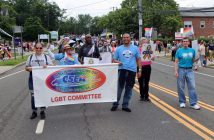 CSEA, through our work with union constituency groups, has always worked to champion the causes of marginalized workers everywhere, and during their recognition months, we highlight how members involve themselves in their own advocacy efforts. In June, we recognize and celebrate Pride Month, which supports the Lesbian, Gay, Bisexual, Transgender and Queer plus community — and commemorates the Stonewall Riots in Manhattan, which occurred in late June 1969.
CSEA, through our work with union constituency groups, has always worked to champion the causes of marginalized workers everywhere, and during their recognition months, we highlight how members involve themselves in their own advocacy efforts. In June, we recognize and celebrate Pride Month, which supports the Lesbian, Gay, Bisexual, Transgender and Queer plus community — and commemorates the Stonewall Riots in Manhattan, which occurred in late June 1969.
For the past 51 years, the LGBTQ+ community and allies have come together to celebrate love, diversity, universal equality, acceptance and pride.
Pride Month has been steadily growing in popularity and size as more people feel safe and comfortable coming out and expressing their true identities, especially at work — which, of course, happens in tandem with increasing societal support of the LGBTQ+ community.
Today, the events held during Pride Month attract millions of people from around the world.
CSEA President Mary E. Sullivan noted that true justice and equality can only be achieved through an organized and empowered effort and said labor unions are a natural vehicle to make that happen.
“CSEA, through groups like Pride At Work, our LGBTQ+ Caucus and other select committees, seek to promote the ability of all working people to self-organize and act collectively to advance the power, needs and interests of the working class in addition to the principles of justice, true democracy and equality,” Sullivan said. “We hope everyone can safely celebrate Pride Month again this year, despite the extraordinary times we are living in.”
 Pride At Work, AFL-CIO, is the LGBTQ+ union voice of members and their allies. Members organize mutual support between organized labor and the LGBTQ+ community to further social and economic justice for all concerned.
Pride At Work, AFL-CIO, is the LGBTQ+ union voice of members and their allies. Members organize mutual support between organized labor and the LGBTQ+ community to further social and economic justice for all concerned.
Pride At Work, which has been recognized an AFL-CIO constituency group since the 1990s, has chapters throughout the state in which CSEA members play active roles.
LGBTQ+ workforce and COVID-19
According to data collected by several leading labor and LGBT advocacy groups, the COVID-19 pandemic is hammering LGBTQ+ workers, especially those of color who are already vulnerable to health care and job discrimination. As a result, many LGBTQ+ workers are struggling with furloughs, layoffs and unemployment, homelessness and food insecurity. This is all happening at a time when LGBTQ+ workers simultaneously face increased rates of poor health outcomes stemming from bias, mental illness and lack of insurance.
And like many yearly celebrations that have been put on hold because of the pandemic, Pride Month is no different. Pride organizers from around the world are scrambling to find alternate ways to express themselves and further their mission. Despite the grim reminders of suffering, despair and loss of life, the LGBTQ+ community marches on.
“Pride celebrations will look a little bit different this year, with many Pride At Work chapters around the country moving to online or virtual events,” said CSEA Rochester Retirees Local member Bess Watts.
Watts, who serves as the president of the Rochester & Finger Lakes Chapter of Pride At Work and is a CSEA LGBTQ+ Committee member, said the purpose of the commemorative month is to recognize the positive impact that lesbian, gay, bisexual and transgender individuals have had on American culture, especially in the workplace.
“Although there will be fewer visual demonstrations of Pride in your hometown, it will still be very meaningful for those who want to participate and be connected to something bigger than themselves,” Watts said.
— Ove Overmyer
LGBTQ Committee Chair: ‘Inclusion goes beyond just us’
When CSEA Statewide LGBTQ Committee Chair Chantalise DeMarco looks at the list of new committee members, she admits she doesn’t know most of the names on there.
While Retiree member and longtime Western Region activist Bess Watts is still a fixture on the committee, most of the other committee members are new.
“It’s a great thing because you’re going to get new ideas and sets of ways people want to look at stuff,” DeMarco said.
The group hasn’t officially met yet because of the coronavirus, but DeMarco hopes to host a virtual meeting soon to continue the work the constituency group has been focused on lately.
“Since the creation of this being a working group, we’ve added things to the CSEA constitution like gender identity and expression and our non-discrimination clause,” DeMarco said. “We’ve also worked on marriage equality in the state and the Gender Expression Non-Discrimination Act (GENDA),” DeMarco said. “Contract language is huge but it’s also very difficult because we have so many contracts.”
DeMarco notes that while the group has taken steps forward, there are often threats to that progress. Marriage equality was a big issue for the committee, but the Supreme Court ruling on it and other progressive rulings are vulnerable due to the current federal administration, according to DeMarco.
The best way to combat ignorance and hate has seemed to be education. The committee has worked on ways to help educate staff and local and unit leadership how best to represent members of the LGBTQ constituency group.
“At our caucuses and meetings, we’ve actually had people who genuinely want to know how best to represent people in our constituency group and that’s been helpful,” DeMarco said.
While DeMarco can’t speak for the committee without having officially met yet, she believes that the only way progress can be made for the LGBTQ community, at large and in the labor movement, is with inclusion and relevancy.
“Inclusion goes beyond just us, this group. We’re all different and it has to be the mindset of the labor movement to recognize every person who brings something to the table is different,” DeMarco said. “We need to continue, and in some ways, start, recognizing how relevant (the LGBTQ community) is to their lives. When we talk about people voting against their best interests, it’s usually because they don’t understand the things we’re talking about and how they’re relevant to people’s lives.”
— Nicholas Newcomb




